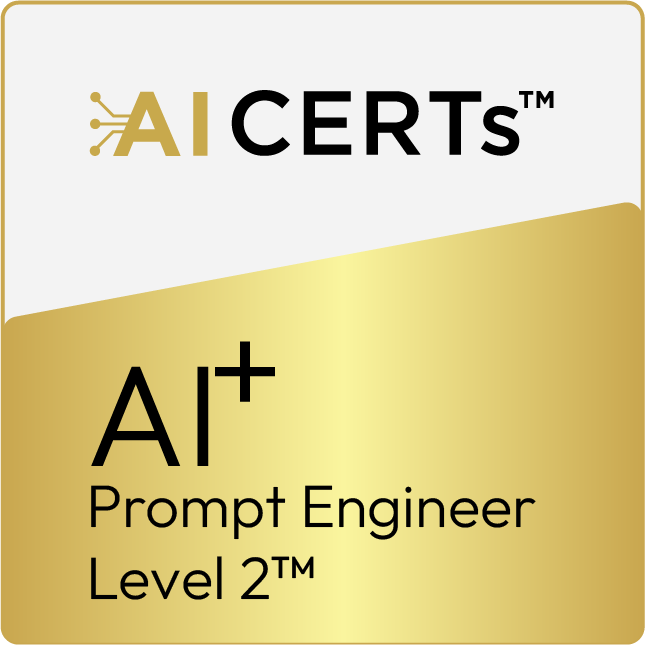AI+ Engineer™
AT-330
Innovate Engineering: Leverage AI-Driven Smart Solutions- Full AI Stack: Learn AI architecture, LLMs, NLP, and neural networks
- Tool Proficiency: Includes Transfer Learning with Hugging Face and GUI design
- Deployment Focus: Build real AI systems and manage communication pipelines
- Practical Mastery: Gain the skills to engineer scalable AI solutions for innovation
Why This Certification Matters
At a Glance: Course + Exam Overview
- Instructor-Led: 5 days (live or virtual)
- Self-Paced: 40 hours of content

Who Should Enroll?
AI & Software Engineers: Enhance your development skills by mastering AI techniques and designing advanced AI systems.
Machine Learning Enthusiasts: Apply deep learning, neural networks, and NLP techniques to real-world AI challenges.
Data Scientists: Strengthen your AI toolkit with engineering techniques for building and deploying scalable AI solutions.
IT Specialists & System Architects: Integrate AI solutions into existing infrastructures, optimizing performance and scalability.
Students & New Graduates: Develop in-demand AI engineering skills and prepare for a successful career in the rapidly growing AI field.
Industry Growth: Powering Next-Gen Infrastructure with AI-First Engineering
- By 2027, 80% of the engineering workforce will need to upskill due to the rise of generative AI (GenAI) technologies. (Gartner)
- AI adoption is accelerating across industries, creating high demand for professionals with advanced AI skills.
- Companies seek AI+ Engineers to develop cutting-edge solutions for AI-driven automation and decision-making.
- As the demand for AI engineering expertise grows, high-paying job opportunities are expanding globally, particularly for those skilled in AI system design and deployment.

Skills You’ll Gain
- AI Architecture
- Neural Networks
- Large Language Models (LLMs)
- Generative AI
- Natural Language Processing (NLP)
- Transfer Learning using Hugging Face
- AI Deployment Pipelines
What You'll Learn
- Course Introduction
- 1.1 Introduction to AI
- 1.2 Core Concepts and Techniques in AI
- 1.3 Ethical Considerations
- 2.1 Overview of AI and its Various Applications
- 2.2 Introduction to AI Architecture
- 2.3 Understanding the AI Development Lifecycle
- 2.4 Hands-on: Setting up a Basic AI Environment
- 3.1 Basics of Neural Networks
- 3.2 Activation Functions and Their Role
- 3.3 Backpropagation and Optimization Algorithms
- 3.4 Hands-on: Building a Simple Neural Network Using a Deep Learning Framework
- 4.1 Introduction to Neural Networks in Image Processing
- 4.2 Neural Networks for Sequential Data
- 4.3 Practical Implementation of Neural Networks
- 5.1 Exploring Large Language Models
- 5.2 Popular Large Language Models
- 5.3 Practical Finetuning of Language Models
- 5.4 Hands-on: Practical Finetuning for Text Classification
- 6.1 Introduction to Generative Adversarial Networks (GANs)
- 6.2 Applications of Variational Autoencoders (VAEs)
- 6.3 Generating Realistic Data Using Generative Models
- 6.4 Hands-on: Implementing Generative Models for Image Synthesis
- 7.1 NLP in Real-world Scenarios
- 7.2 Attention Mechanisms and Practical Use of Transformers
- 7.3 In-depth Understanding of BERT for Practical NLP Tasks
- 7.4 Hands-on: Building Practical NLP Pipelines with Pretrained Models
- 8.1 Overview of Transfer Learning in AI
- 8.2 Transfer Learning Strategies and Techniques
- 8.3 Hands-on: Implementing Transfer Learning with Hugging Face Models for Various Tasks
- 9.1 Overview of GUI-based AI Applications
- 9.2 Web-based Framework
- 9.3 Desktop Application Framework
- 10.1 Communicating AI Results Effectively to Non-Technical Stakeholders
- 10.2 Building a Deployment Pipeline for AI Models
- 10.3 Developing Prototypes Based on Client Requirements
- 10.4 Hands-on: Deployment
- 1. Understanding AI Agents
- 2. Case Studies
- 3. Hands-On Practice with AI Agents
Tools You’ll Master

TensorFlow

Hugging Face Transformers

Jenkins

TensorFlow Hub
Prerequisites
- AI+ Data™ or AI+ Developer™ course should be completed.
- Basic understanding of Python programming is mandatory for hands-on exercises and project work.
- Familiarity with high school-level algebra and basic statistics is required.
- Understanding basic programming concepts such as variables, functions, loops, and data structures like lists and dictionaries is essential.
Exam Details
Duration
90 minutes
Passing Score
70% (35/50)
Format
50 multiple-choice/multiple-response questions
Delivery Method
Online via proctored exam platform (flexible scheduling)
Exam Blueprint:
- Foundations of Artificial Intelligence - 5%
- Introduction to AI Architecture - 10%
- Fundamentals of Neural Networks - 15%
- Applications of Neural Networks - 7%
- Significance of Large Language Models (LLM) - 8%
- Application of Generative AI - 8%
- Natural Language Processing - 15%
- Transfer Learning with Hugging Face - 15%
- Crafting Sophisticated GUIs for AI Solutions - 10%
- AI Communication and Deployment Pipeline - 7%
Choose the Format That Fits Your Schedule
What’s Included (One-Year Subscription + All Updates):
- High-Quality Videos, E-book (PDF & Audio), and Podcasts
- AI Mentor for Personalized Guidance
- Quizzes, Assessments, and Course Resources
- Online Proctored Exam with One Free Retake
- Comprehensive Exam Study Guide
- Hands-on Labs
Instructor-Led (Live Virtual/Classroom)
- 5 days of intensive training with live demos
- Real-time Q&A, peer collaboration, and hands-on labs
- Led by AI Certified Trainers and delivered through Authorized Training Partners
Self-Paced Online
- ~40 hours of on-demand video lessons, e-book, podcasts, and interactive labs
- Learn anywhere, anytime, with modular quizzes to track progress
Discover Your Ideal Role-Based Certifications and Programs!
Not sure which certifications to go for? Take our quick assessment to discover the perfect role-based certifications and programs tailored just for you.
Get CertifiedFrequently Asked Questions
The certification covers a wide range of topics including Foundations of AI, AI Architecture, Neural Networks, Large Language Models (LLMs), Generative AI, Natural Language Processing (NLP), and Transfer Learning using Hugging Face.
This certification is ideal for individuals seeking to gain a deep understanding of AI concepts and techniques, whether they are beginners or have some prior knowledge of AI.
Participants will gain hands-on experience in building and deploying AI solutions. Skills include developing neural networks, fine-tuning large language models, implementing generative AI models, and crafting sophisticated GUIs for AI applications. Additionally, participants will learn to navigate AI communication and deployment pipelines.
The course emphasizes hands-on learning, enabling participants to develop practical skills in creating Graphical User Interfaces (GUIs) for AI solutions and understanding AI communication and deployment pipelines.
The AI+ Engineer™ Certification enhances your professional profile by demonstrating proficiency in AI fundamentals and advanced applications. It equips you with in-demand skills, giving you a competitive edge in the job market and opening doors to lucrative career opportunities in tech, healthcare, finance, and other industries.


